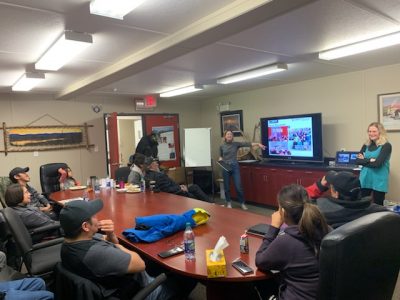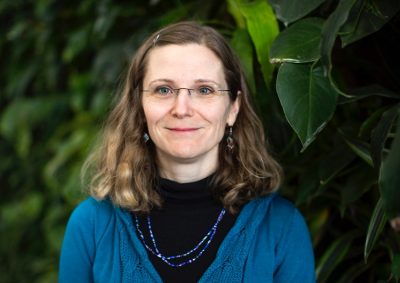As Canada works towards net-zero carbon emissions by 2050, capturing carbon or sustainable energy technology is often the focus. The role of public policy and the cooperation of governments, industry and local communities is also critical to accomplish the goal. The media also has a role to play in public acceptance of new technologies.
Alexandra Mallett, an associate professor and graduate supervisor of the Master of Arts (MA) Sustainable Energy (Policy) program in the School of Public Policy and Administration, works on public policy in sustainable technology and innovation and environmental politics.
“Alternative forms of innovation play a critical role in sustainability transitions,” says Mallett. “Not only with low carbon, but also lower environmental footprints and more inclusive decisions about energy supply and demand.”
“By focusing on these ‘big breakthrough technologies’ (hydrogen, nuclear fusion, carbon capture and storage), important sources of innovation that can help catalyze sustainability transitions such as different ways of making decisions about energy supply and demand are often missed.”
Decentralizing Energy Systems
Mallett says, “There are movements to decentralize electricity systems — away from building more large-scale power plants that use fossil fuels as their power source and are owned by large government or investor-owned utilities — to more modular, smaller-scale and renewable energy options with less conventional owners at the community-level.”
These new business models and players include Indigenous groups such as Vuntut Gwitchin First Nation, which entered a purchasing power agreement with the electricity utility ATCO for their solar project in Old Crow, Yukon and sustainable energy cooperatives such as Ottawa Renewable Energy Cooperative and SolarShare in Toronto.
“Community Choice Aggregation (CCA) in the U.S. are programs that allow governments at the local level to procure power for their communities from alternative providers alongside utilities,” says Mallett.
“Another example is the Brazilian non-profit organization Sociedade do Sol which developed a low-cost solar water heater using local expertise and components. These are sustainable options that are not at the technological frontier, but rather more accessible and affordable for the majority of the population.”
Realizing Innovation Through a Systems-Based Approach
The latest UN climate report released this month made clear that eliminating greenhouse gases will not be enough to stop some irreversible effects of climate change. More needs to be done to reverse certain impacts of climate change, such as extreme heat, drought and wildfires.
Mallett says that taking a systems-based approach to addressing sustainability and the climate crisis is key. She highlights the work of scholars focusing on sustainability transitions who point to the need for fundamental shifts in society, including how we design cities, grow food, use buildings and travel.
She was part of the organizing team for the 10th International Sustainability Transitions conference in 2019, along with colleague James Meadowcroft, PhD graduate Daniel Rosenbloom and Sustainable Energy (Policy) graduate students Jessica Leis and Gabrielle Morrison.
“Taking a systems-level or ‘bird’s eye view’ allows for more opportunity to see linkages and the potential for innovation in alternative ways. For instance, efforts are being made by Parks Canada to create and revitalize more urban forests. I hope their efforts to engage with Indigenous Peoples — stewards of the land for millennia — will be followed through.
“Pursuing nature-based options that can help to counter the effects of climate change while also removing carbon dioxide from the atmosphere is essential. Planting trees — natural power carbon capturers and shade providers — will lessen the effects of extreme temperatures like we saw this summer around the world.”
Interdisciplinarity is Key
Mallett is part of a Carleton interdisciplinary master’s program in Sustainable Energy Engineering and Policy. She is also part of an interdisciplinary research project, Future Energy Shift, with recent MA Sustainable Energy graduate Lauren Johnson and current student Emily Stone. The team is defying conventions and breaking down disciplinary silos to address complex challenges.
They are looking at the possibility of a gravity turbine system for tall buildings. Researchers are working with community partners and housing industry workers to conduct public consultation and building modelling.
Public Policy is Essential
Mallett points to the importance of public policy in spurring these sustainability transitions, but says that crafting and implementing policy must also be done in a systemic way.
“It is critical that we develop policies that promote the development and use of low-carbon technologies” she says. “These policies include eco-labels, emission credits or carbon taxes and voluntary agreements. However, the implications of these low-carbon promotion efforts on overall sustainability efforts — such as mining for minerals and metals used for batteries in electric vehicles, which may lead to severe environmental repercussions if left unchecked —must also be considered at the same time. An example of this is the environmental licensing process to reduce the environmental impacts of mining in Brazil.”
“Innovation is essential for creating solutions to the climate crisis,” says Mallett. “Scholars, policy-makers and practitioners are working tirelessly to effectively realize these changes. Unfortunately, outdated assumptions about policy, investment and markets often remain.”
Mallett’s research finds that conventional ways of approaching innovation are inadequate at effectively understanding innovation systems. “We must look beyond frontier technologies, traditional experts and financial gain. Innovation in energy system change must acknowledge cultural, social, environmental and political issues.”
Community Engagement and Cooperation
There is also a need for socio-political acceptance of smart-grid technologies that help the climate through renewable energy, electric transportation and energy conservation.
“With any new technology, there is often a focus on technological problems, but there are also socio-political explanations to these issues,” says Mallett. “What piqued my interest is that I found that the bulk of research on innovation related to sustainable energy technologies, although lots of innovative activities are concurrently happening.”

Jessica Leis (MA Sustainable Energy candidate), Alexandra Mallett, and several community members take part in a discussion session in Colville Lake, Northwest Territories.
“In the North, there are governance innovations underway as Indigenous groups and municipalities are gaining more decision-making power through the modern treaty process and devolution. I want to see to what extent these kinds of innovations play a role in helping (or hindering) sustainable energy transitions.”
Mallett’s research finds that with low-carbon technology, we are too focused on outcomes and neglect technology cooperation processes — a theme also prominent in her earlier work with researchers from the University of Sussex’s Science Policy Research Unit and The Energy and Resources Institute on technology collaboration in India. Innovation systems can help us to understand what makes cooperation more effective.
“My research working with Carleton MA-SE students Micah Ton and Jessica Leis and partners in Northwest Territories looks at alternative pathways towards energy self-sufficiency for Indigenous and other northern communities.”
“Local governance structures and cooperation are crucial to increasing the acceptance of new technology.”
By Mary Giles
Thursday, August 19, 2021
